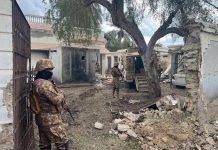According to a December 12, 2017 Urdu-language news site report, during a high-level meeting presumably between Chinese and Pakistani officials held on the last day of the November Chinese Economic Summit in Hong Kong, China offered to train Pakistani security forces to protect both the China-Pakistan Economic Corridor (CPEC) projects in Pakistan and the Chinese nationals working on them. That follows a September 17, 2017 official CPEC announcement, whereby China would “assist” Pakistan in “capacity building” of “civil armed forces.”
At face value, the Chinese offer appears to be a predictable response to the proliferation of Islamic extremist groups, the permanent Taliban support and recruiting network, and the festering independence insurgency, all in Pakistan’s southwestern province of Balochistan, a region whose stability is critical to the success of CPEC, a $46 billion Chinese infrastructure investment in Pakistan.
What the December 12th Urdu report states that the official September 17th communique doesn’t is that Chinese training will include the “Special Security Division,” which widens the scope considerably.
The Special Security Division is a 2-star Pakistani military command of up to 15,000 personnel established in September 2016 to protect CPEC from internal and external threats. It is composed of nine Pakistan Army infantry battalions, six “Civil Armed Forces” elements of Army Ranger and Frontier Corps units, and a maritime security command led by the Pakistani Navy, which includes the Maritime Security Agency and the Pakistani Marines.
The number of Chinese military and security trainers to be stationed in Pakistan is undisclosed, but based on the size of the Special Security Division alone, the total complement of Chinese needed to fulfill all the CPEC security requirements is expected to be sizable.
Also in the past week, Air Chief Marshal Sohail Aman, Chief of the Air Staff of the Pakistan Air Force (PAF), announced a joint China-Pakistan space program that will begin by sending a satellite into orbit within the next two years. In that regard, there have been on-the-ground reports in the past few months of high-level Chinese delegations visiting Sonmiani, Balochistan, the location of Pakistan’s space port. Those reports have also included rumors of Chinese purchases of large blocks of land in the Sonmiani region.
In April 2017, an agreement was signed whereby a state-run Chinese company, the China Overseas Port Holding Company will handle the operations of Pakistan’s strategic Gwadar port for a period of 40 years.
Pakistan is not shy about stating its interest in joint naval operations with China from Gwadar:
“China and Pakistan have found common ground in terms of maritime interest in the region. Gwadar port can be used for joint naval patrols in the Indian Ocean, further increasing the naval outreach of China and Pakistan in the region. Gwadar port will increase the countries’ naval movements and further expand defense cooperation, especially in the naval field.”
In addition, there has been a general shift in Chinese military personnel in favor of naval and marine corps forces at the expense of land forces. According to reports, some of those forces are destined for Djibouti and Gwadar, the strategy being:
“The Chinese have been attracted to Gwadar primarily because of its proximity to the Straits of Hormuz, through which most of their energy flows. Gwadar provides a base from where they can exercise firm control over this energy flow, both in terms of monitoring and protection when the situation demands such effort. With the establishment of a Chinese military base at Djibouti and the continuing anti-piracy effort, naval operations based out of Gwadar will provide the Chinese with a near-continuous naval presence from the Makran coast [southern Pakistan on the Arabian Sea] to the Straits of Bab-el-Mandeb [entrance to the Red Sea and gateway to the Suez Canal].”
The Chinese are also expanding the Gwadar International Airport to handle “heavies.” That will provide an airlift capability linking Gwadar at the mouth of the Persian Gulf and the Chinese base in Djibouti at the entrance of the Red Sea and the Suez Canal.
Also in the past week — similar to the Chinese “management” of Gwadar — Sri Lanka relinquished authority over its southern port of Hambantota to the Chinese, having signed a 99-year lease with the state-controlled China Merchants Port Holdings.
The Chinese presence in Hambantota outflanks both India and the U.S. naval base in Diego Garcia and provides an additional strategic choke point, a potential for regional hegemony and, in combination with the other developments, largely renders current U.S. policy in Afghanistan obsolete.
Lawrence Sellin, Ph.D. is a retired US Army Reserve colonel, an IT command and control subject matter expert, trained in Arabic and Kurdish, and a veteran of Afghanistan, northern Iraq and a humanitarian mission to West Africa. He receives email at lawrence.sellin@gmail.com.






























